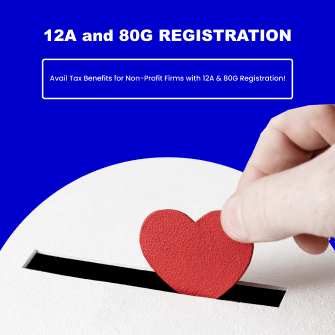
You can easily complete 12A and 80G Registration firm registration online through Compliance Gurukul. For a sole 12A and 80G Registration, only the PAN & Aadhaar card of the business owner is required. We can help you obtain the following registrations in less than 15 days:
Once, you have registered for the 12A and 80G Registration firm registration online on Compliance Gurukul, please follow the steps below and upload the following documents by logging into Compliance Gurukul Software.
In India, non-profit organisations can benefit significantly from two specific registrations provided by the Income Tax Department: 12A and 80G. The 12A registration grants non-profit organizations an exemption from paying income tax on their earned income, which can greatly aid in maximising the funds available for their charitable activities. Additionally, the 80G registration offers a substantial benefit to the donors of these organisations, allowing them to claim deductions on their taxable income for any donations made. So, the 12A and 80G registration process online must be done by the non-profit organisations to avail tax deduction benefits.
At Compliance Gurukul, we understand the importance of obtaining Section 12A and 80G registrations for your non-profit organisation. We offer comprehensive assistance and guidance throughout the registration process to help you get the benefits and privileges provided under these sections of the Income Tax Act.
12A and 80G registrations are critical tax provisions for NGOs in India, enabling charitable institutions to avail themselves of specific tax exemptions and benefits. These exemptions are governed by Sections 12A/12AA and 80G of the Income Tax Act of 1961:
This certification is provided under the Income Tax Act 1961 to non-profit organisations in India. Once registered under Section 12A, an NGO becomes eligible for tax exemption on its income, meaning it doesn’t have to pay tax on surplus funds generated through grants, donations, or other revenue as long as these funds are used for charitable purposes. This registration is crucial for NGOs as it helps in maximising the funds available for their activities.
While 12A registration benefits the NGO, 80G registration is intended to incentivise donors. It allows individuals or entities who donate to a 12A-registered NGO to claim a deduction on their income tax. This deduction is a percentage of the amount donated and can significantly reduce the donor's taxable income. The purpose of this provision is to encourage more donations by providing financial benefits to donors.
The key difference between 12A and 80G is that 12A registration provides tax exemption on an NGO’s income, while 80G registration allows donors to avail tax deductions on their donations. Both registrations enhance NGOs' ability to attract contributions by offering fiscal advantages to both the organisations and their benefactors. So, it is useful to register and obtain the 12A 80G certificate.
To be eligible for Section 12A/80g registration, organisations need to meet specific requirements set by the Income Tax Department:
This section pertains to registering charitable or religious NGOs, enabling them to enjoy tax exemptions on income derived from donations. To qualify for Section 12A registration, an organisation must meet the following criteria:
This allows donors to claim tax deductions on donations made to eligible non-profit organizations. Eligibility for Section 80G registration includes:
For NGOs to successfully complete the online registration process for 12A and 80G, they must provide a comprehensive set of documents required for 12A and 80G registration that verify their legal registration. Failure to provide these documents could result in the application being considered incomplete and subsequently rejected by the authorities. Below is a detailed list of documents required for 12A and 80G registrations in India.
Here's the list covers the 12A and 80G registration documents required: